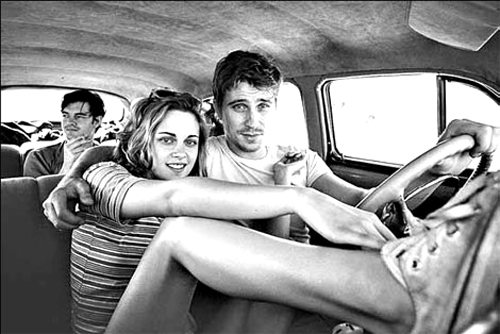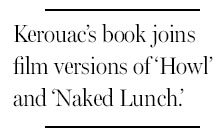

 |
|
"On the Road," with Sam Riley, rear, Kristen Stewart and Garrett Hedlund, is faithful to the novel. Gregory Smith / IFC Films-Sundance Selects |
For filmmakers trying to capture the spirit of the Beats, there has always been the pressure - stated or not - of their work living up to the legends.
It has been no different for Walter Salles, the first director to finally wrestle Jack Kerouac's "On the Road" to the big screen more than five decades after its publication caused a literary sensation and launched a thousand road trips, not to mention innumerable road movies.
Mr. Salles's answer was to endear himself to virtually every living Beat poet, artist and philosopher with a stake in the book's legacy while literally retracing Kerouac's crisscrossing of the country with a Super 8 camera.
He interviewed the poets Gary Snyder, Lawrence Ferlinghetti, Michael McClure, Diane di Prima and Amiri Baraka, as well as the Kerouac biographers Gerald Nicosia and Barry Gifford, who served as consultants on the film. It is how he spent five of the project's eight years. The film had its premiere in May at the Cannes Film Festival and is expected to reach theaters in autumn.
"I was well aware that my passion for the book was not sufficient to justify launching into an adaptation straight away," Mr. Salles, who is compiling the footage into a documentary, said by e-mail. "In fact, making the feature film ceased to be my main concern at the time. Understanding and getting to know these people better became my main goal."
"On the Road" completes the holy trinity of Beat masterpieces that have confounded filmmakers for several years, including David Cronenberg's wildly fanciful take on William S. Burroughs's "Naked Lunch," from 1991, and Rob Epstein and Jeffrey Friedman's 2010 docudrama of Allen Ginsberg's "Howl."
The Beats' core group of characters were so intertwined in their heyday that "Howl," "Road" and "Lunch" were published within three years of each other, and all three film
versions feature an overlapping cast of characters.
It's no coincidence that "On the Road" was made by the same international creative team - including the director, who is Brazilian, and the Puerto Rican screenwriter Jose Rivera - behind "The Motorcycle Diaries," about another road trip undertaken by a thoughtful introvert (in this case Che Guevara) with a rambunctious traveling mate.
In "On the Road," Sal Paradise, Kerouac's alter ego, is a writer itching to experience adventure, with Dean Moriarty, modeled after Neal Cassady, as the driving force. Sam Riley, cast as Paradise, was aware of the impossible expectations of such a project from the get-go. "The first character I ever played in a movie was an iconic British singer" - Ian Curtis of Joy Division in "Control" - "with an equally zealous fan base," he said. "So, in a weird way, it's all I know - to set myself up for a shooting, to some extent."
Mr. Rivera's screenplay hews closely to the book, while also using elements excised from the infamous scroll on which Kerouac banged out most of his raw material.

Russell Banks, a novelist who knew Kerouac in his later years, also tried his hand at an "On the Road" script . He views Kerouac's novel as a metaphor for "the end of American innocence" and felt the script needed the framework of the turbulent events of the late '60s, "on the other side of disillusionment that those characters didn't know was coming," he said by phone.
Mr. Banks bookended his story with an incident from his own life, when the 45-yearold Kerouac blew into Chapel Hill, North Carolina, in 1967, two years before he died, and spent a week at Mr. Banks's house, boozing it up, telling stories and generally causing a ruckus.
"He was at that point very far gone," Mr. Banks recalled. "He was ill physically and mentally, too."
The interpretation that has now made it to the screen is set in the late '40s and ends in 1951. It doesn't shy away from the story's homoerotic underpinnings or Moriarty's activities as hustler, adulterer and thief. He also exhibits the physical prowess of a college athlete, the sexual swagger of a midcentury Casanova and the bighearted optimism of a saint.
"Neal was a fascinating character for a lot of people, and other people just went the other way as soon as they saw him," said Barry Gifford, a novelist who wrote a biography of Kerouac and an earlier script of "On the Road."
In the end it was John Cassady, the son of Neal, who reminded Mr. Salles that "On the Road" was a story of men and women in their youth. It was a time when, Mr. Salles said, "they had no idea of what they would become."